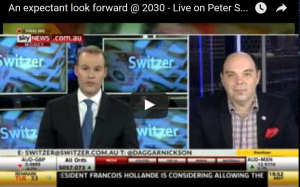A glimpse at the way we will live, work and educate in 2030 / Peter Switzer Sky News TV, ABC Far North
 Every year, as our newest school kids start kindergarten, I like to take an expectant look forward to the year that many of them may enter the workforce, so welcome to 2030 when:
Every year, as our newest school kids start kindergarten, I like to take an expectant look forward to the year that many of them may enter the workforce, so welcome to 2030 when:
Australia
- Australian population will have grown to 28,481,000 (23,972,800 today)
- 1 in 5 Australian’s will be over 60 years old
- the ratio of workers to retirees will be 3:1 (5:1 today)
- the average Australian house will cost $3,000,000 ($658,608 today)
- the average household income will be $275,000 ($145,400 today).
Global
- global population will be 8,500,766 (7,349,472 today)
- India will have surpassed China as the most populous country on the earth
- America’s global dominance will have waned
- the world’s middle class will have risen from 4.9 billion (2.1 billion today)
- 66% of the new middle class will be living in Asia
- lower global birth rates
- life expectancy increases
- healthier lives
Education 
- Australian retention rates for completing Year 12 will be 90% (83.6% today)
- There will no written exams to mark the end of schooling, nor a single university score required to gain entry to higher education
- Learning institutions will be hubs, bringing together students, educators, industry and others to provide learning opportunities
- There will be an increased emphasis on global qualifications
- Universities and higher education will be vastly different, offering bespoke one-off qualifications and a mixture of modalities and physical and virtual opportunities to study
- Nano-degrees will exist to teach, assess and accredit specific one-off skills learnt in real-time as, where and when needed will be the norm
- Students work, understanding and proficiency will be monitored and assisted in real-time by LMS (Learning Management Systems) that will 24/7 assist human classroom teachers, providing unique instructions, examples and assessment for each student
Technology
- 1 in 4 cars sold will be fully autonomous
- Robots, Artificial Intelligence, Drones and Connected Cities will all be as ordinary as gas, electricity and water.
- Mobile phones, keyboards and mice will be relegated to museums
Employment
- there will be too many human workers competing globally for too few jobs
- 9 – 5 Monday to Friday work will have given way to project and task-work done however, whenever and wherever it’s appropriate
- many of today’s routine jobs will have been handed over to technology
- in an ironical twist this new technology will be responsible for creating millions of new human jobs, tasks, careers and industries.
Life
- This year’s kinder students will live to 120
- work into their 90’s
- undertake 2 simultaneous income producing activities, or more, at any one time
- have 6 careers and 14 jobs
- complete tasks and work in industries that are yet to be discovered
- will need to create their own work, not apply for it
These were just some of the insights that James Daggar-Nickson host of Peter Switzer’s Sky Business TV and I chatted about, as well as the economic, political and human ramifications of this new world that is only 15 years away and Phil Staley of ABC Radio’s Far North Queensland and I picked up in our next regular on-air catch up.
Watch this TV segment (recorded 25th January 2016) and / or listen to the radio interview below (recorded 1st February 2016) and then add your thoughts to what we may see in 2030.
Listen to the interview with Phil Staley ABC Radio Far North – 1st February 2016 (19 minutes 22 seconds)